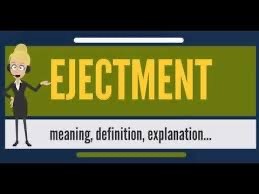Ejectment Related Matters
Introduction
Ejectment refers to the legal process of removing a tenant or an unauthorized occupant from a property. In India, eviction laws are primarily governed by The Transfer of Property Act, 1882, The Rent Control Acts (state-specific), and The Civil Procedure Code, 1908. The process varies depending on whether the property is residential, commercial, or agricultural and whether it is governed by rent control laws.
Key Laws Governing Ejectment in India
-
The Transfer of Property Act, 1882
- Governs lease agreements and conditions for eviction under Section 106 (Termination of Lease).
-
The Rent Control Acts (State-Specific Laws)
- Protects tenants from arbitrary eviction but allows landlords to evict in specific circumstances (e.g., non-payment of rent, misuse of property).
-
The Civil Procedure Code, 1908 (Order 39, Rule 1 & 2, Order 21, Rule 35 & 36)
- Provides the procedure for obtaining eviction orders and enforcement through courts.
-
The Specific Relief Act, 1963
- Allows landlords to seek relief in cases where tenants refuse to vacate despite legal eviction orders.
-
The Indian Contract Act, 1872
- Governs lease agreements and breach of contract conditions leading to ejectment.
Grounds for Ejectment (Eviction) of a Tenant
A landlord can legally evict a tenant under the following circumstances:
1. Non-Payment of Rent
- If a tenant fails to pay rent for a specified period, the landlord can issue a legal notice and seek eviction.
2. Violation of Lease Agreement
- If the tenant sublets the property, makes structural changes, or uses it for illegal activities, eviction can be initiated.
3. Personal Use of Property by Landlord
- A landlord can seek eviction if they require the property for personal use or for their family members.
4. Damage to Property
- If the tenant causes substantial damage to the property, the landlord can file for ejectment.
5. Expiry of Lease Term
- If a lease expires and the tenant refuses to vacate, the landlord can seek eviction under Section 106 of the Transfer of Property Act, 1882.
6. Illegal or Unauthorized Occupation
- If a person is occupying a property without legal rights, they can be forcibly evicted through court intervention.
Legal Procedure for Ejectment (Eviction) in India
1. Serving a Legal Notice
- A legal eviction notice must be served to the tenant under Section 106 of the Transfer of Property Act, 1882.
- The notice period is 15 days for monthly tenants and six months for yearly tenants unless otherwise specified in the lease.
2. Filing an Eviction Suit
- If the tenant does not vacate, the landlord must file an eviction suit in the appropriate civil court.
- The petition should include proof of default or violation of lease terms.
3. Court Hearing & Tenant’s Defense
- The court will hear both parties. Tenants can defend themselves by proving:
- Rent was paid.
- The eviction is malicious or unfair under rent control laws.
- The property is not required for landlord’s personal use.
4. Eviction Order & Execution
- If the court rules in favor of the landlord, it will issue an eviction decree.
- If the tenant refuses to vacate, the landlord can approach the court under Order 21, Rule 35 & 36 of CPC for police assistance in executing the order.
Tenant's Rights in Ejectment Matters
- Right to Notice: A tenant must receive a proper legal notice before eviction.
- Protection Under Rent Control Acts: If the property is under rent control laws, the tenant can challenge the eviction.
- Right to Fair Trial: A tenant can contest false eviction claims in court.
- Right to Compensation: If the landlord evicts unlawfully, the tenant can claim damages or alternative accommodation.
Ejectment of Unauthorized Occupants
- If a person occupies land/building without a lease or permission, they are considered trespassers.
- The property owner can file a suit for possession under The Specific Relief Act, 1963.
- In government properties, The Public Premises (Eviction of Unauthorized Occupants) Act, 1971 allows swift eviction.
Judicial Precedents & Case Laws
-
K.K. Verma vs Union of India (1954)
- The Supreme Court held that a landlord must follow due process for eviction and cannot use force.
-
Satyawati Sharma vs Union of India (2008)
- The SC ruled that landlords cannot be indefinitely deprived of their property under rent control laws.
-
Krishna Pillai Rajasekaran Nair vs Padmanabha Pillai (1992)
- Stated that a tenant refusing to vacate after lease expiry must be removed through legal means.
Conclusion
Ejectment or eviction must follow a legal process to ensure fairness for both landlords and tenants. The Transfer of Property Act, Rent Control Acts, and CPC provide the necessary legal framework. Landlords must follow due process, and tenants have legal rights to defend against unfair eviction. In the case of unauthorized occupants, special laws allow swift removal through court action.
